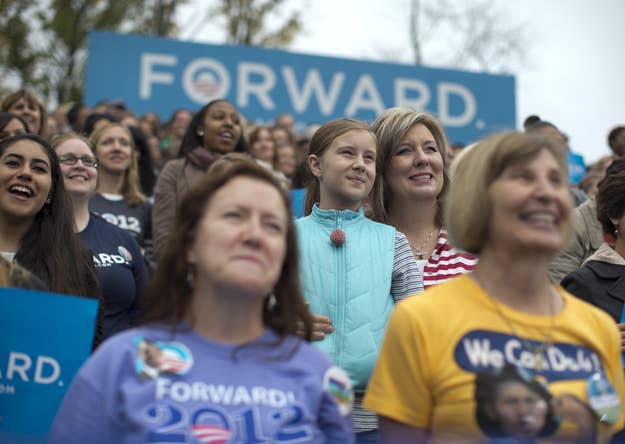
A slew of news reports are casting Mitt Romney's performance in Monday's foreign policy debate as an effort to win women voters. Foreign policy isn't traditionally thought of as a women's issue, but that reveals a problem with "women's issues" in general: they don't really exist.
Everything traditionally identified as a women's issue affects people besides women, and you can find women who care passionately about pretty much every issue. This doesn't mean pundits and journalists shouldn't be talking about how contraceptive coverage, or healthcare, or the economy, or (yes) foreign policy can affect women disproportionately. It does mean people who talk about campaigns — and politics more generally — need to stop creating a special category called "women's issues" which we then take less seriously. If women are really going to decide this election, then it's time to recognize that their "issues" aren't a sideshow.
Usually when media outlets talk about women's issues, they mean reproductive rights. These are hugely important, but they affect millions (billions, really, if you take into account the US's policies toward contraception and sex ed abroad) of people who aren't women. As Jezebel's Erin Ryan explained yesterday, the availability of birth control and abortion have a big effect on straight men — they have to deal with the consequences of an unintended pregnancy too. Trans men may need birth control (or abortion) themselves. And since 53% of men in one recent poll identified themselves as "pro-life," presumably abortion is an important issue for them too.
Pay equality also gets classed as a women's issue, which would seem to make a little more sense — until you consider that it's not just women who rely on women's wages. In 2011, 12% of women were solely responsible for caring for kids or other family members. Just over 8% of married women were their family's sole breadwinner. And nearly 40% of married women now make a bigger share of the household income than their husbands, meaning families can no longer afford to have their highest earner making 77 cents to her male coworkers' dollar.
In any campaign, some issues are going to poll better with women than with men (although these issues do seem to change at least somewhat over time and from poll to poll), and candidates and their staff are always going to adjust accordingly. But it's reasonable to ask the people who cover campaigns to look closely at who's affected by issues like abortion rights and equal pay — and it's never just women.
And although these issues are crucial, women care about a lot of other things too. In one recent poll, women were more likely than men to say foreign policy concerns would affect their votes. In another, while women were most likely to list abortion as the most important election issue to them, the runner-up was an issue rightly considered universal: jobs. They also cared more about healthcare than men did. And according to CNN's real-time debate poll, Florida women were more impressed than men were with Obama's comments about killing Osama bin Laden.
None of this is new — married women with kids who cared a lot about stopping terrorism (the "security moms") were widely credited with Republican victories in 2002 and 2004. Last night's debate showed that both candidates at least recognized they were supposed to be talking to women as well as men when they talked foreign policy, and yet "women's issues" remains a journalistic proxy (one I'm sure I've been guilty of using) for issues directly connected to the reproductive organs. Again: crucial, but not the whole story. Women, like men, are complex creatures to whom lots of things matter; and since they make up more than 50% of America's population, what matters to them is going to end up mattering to everybody.
